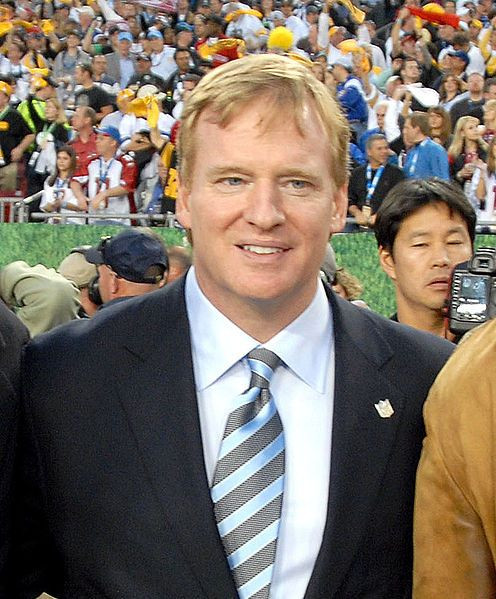NFL’s Roger Goodell Awards Grants As Part Of ‘Head Health Initiative’ To Fund Traumatic Brain Injury Research

The National Football League (NFL) continues to make strides in its initiative for traumatic brain injury research. Last year, NFL commissioner Roger Goodell made headway with the “Head Health Initiative,” a $60 million partnership that will fund research and technology for the brain. Yesterday, Goodell announced their next major step in better understanding traumatic brain injuries (TBI) among football player — the NFL will award grants to several research proposals.
“Today, we are making a tangible commitment toward accelerating progress in our knowledge of the brain — how it works, how it can be better protected, and how we can help it to recover from injury,” Goodell and Jeffrey R. Immelt, CEO of General Electric (GE), wrote in a news release on NFL Revolution.
The proposals receiving grants would help doctors better diagnose traumatic brain injury. Some of these include a blood test that could quickly identify and measure mild traumatic brain injury; a brain imaging technique that could identify broken connections in the brain post-TBI; as well as an electroencephalography (EEG) that could serve as an on-field imaging test, Goodell and Immelt wrote in their announcement. “These ideas are designed to help doctors identify brain injury and improve their ability to manage recovery,” they wrote on NFL Evolution. “Small intrusions like pinpricks of blood or a brief sideline exam of brainwaves would convey who is injured and who is recovered.”
In the past several years, the NFL has been under scrutiny because of several former professional football player suicides. Research discovered that contact sport injuries such as concussions or repeated blows to the head were actually linked to memory loss, mental decline, and suicide later down the road. Traumatic brain injury leaves the brain damaged, but symptoms of mental decline or psychological disorders often don't begin showing up until decades after football players have retired. Several former football players sued the NFL for not warning them of the brain risks associated with playing football long-term.
In December, the NFL chose to collaborate with the National Institutes of Health (NIH) to fund a research initiative on brain trauma. “We need to be able to predict which patterns of injury are rapidly reversible and which are not,” Story Landis, director of the National Institute of Neurological Disorders and Stroke (NINDS), said in a news release. “This program will help researchers get closer to answering some of the important questions about concussion for our youth who play sports.” The program is a partnership between the NFL, GE, the U.S. Military, the NCAA and Under Armour — in addition to various neurosurgeons and entrepreneurs.
“[W]e are committed to making real impact in the short term,” Goodell and Immelt stated. “The grant winners were chosen, in part, on their ability to create life-changing tools, treatments, and devices that can play out in real time. Research, fact-based analysis, and disciplined peer review are important, but so are results that can be put into action to help today’s athletes at all levels.”



























